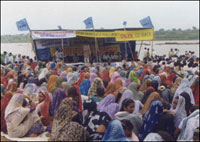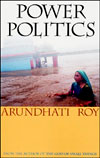When your first novel wins the Booker Prize, sells 6 million copies, and earns you a publicity trip around the world, what do you do next? Arundhati Roy, author of the 1997 novel The God of Small Things, decided she wanted to switch from fiction to the hard facts.
A year after Roy’s big debut, the New Delhi resident published a slim volume called The Cost of Living. The book consisted of two political essays. One attacked her country’s nuclear buildup, while the other condemned the Narmada Valley Development Project, a series of 3,200 dams planned for west-central India’s Narmada River and its tributaries.
The three essays that make up Roy’s newest book, Power Politics, prove that she is serious about giving equal shrift to prose and politics. She warns her readers that her political writing includes “some disparate bits of history and geography that may mar the gentle art of storytelling,” and it’s true that the language in Power Politics doesn’t have the just-invented freshness of that in The God of Small Things. But Roy is aiming for clarity and impact, and her new essays accomplish those goals with a novelist’s flourish.
In the essay “Power Politics: The Reincarnation of Rumpelstiltskin,” Roy returns to the subject of the Narmada Valley Development Project. She dissects the global economic forces underpinning the Maheshwar Dam — the first private dam on the Narmada River — and animates those forces with a character she calls Rumpelstiltskin. “What kind of potentate is Rumpelstiltskin?” she asks. “Powerful, pitiless, and armed to the teeth. He’s a kind of king the world has never known before. His realm is raw capital, his conquests emerging markets, his prayers profits, his borders limitless, his weapons nuclear.”
Rumpelstiltskin, she says, has sweet-talked India into importing products it could manufacture itself, taking on debt for massive private projects such as the Maheshwar Dam, and absorbing tremendous human costs — not least the 56 million people expected to be displaced by the Narmada dams. “When the history of India’s miraculous leap to the forefront of the Information Revolution is written,” she says, “let it be said that 56 million Indians (and their children and their children’s children) paid for it with everything they ever had. Their homes, their languages, their histories.”

Mass rally against the Maheshwar Dam.
Photo: Narmada Bachao Andolan.
As the second essay in Power Politics proves, Roy isn’t just fighting with her pen. As an active supporter of the Narmada Bachao Andolan (the grassroots resistance to the Narmada Valley Development Project), she recently joined 4,000 dam opponents in a march to the Maheshwar Dam site. Roy has been accused of contempt of court because of her participation in an anti-dam demonstration outside India’s Supreme Court, and because of her alleged attacks on some men leaving the court. “On Citizens’ Rights to Express Dissent” is a reprint of her official reply to these accusations. She’s unrepentant, fearless, and sometimes funny — simultaneously attacking her accusers’ understanding of democracy and poking fun at their spelling mistakes. In late October, after the publication of Power Politics, she once again refused to apologize to the court.
Roy’s reputation as an activist does not always blend seamlessly with her fame as a prize-winning novelist. In the last essay in Power Politics, “The Ladies Have Feelings, So … Shall We Leave it to the Experts?” she wryly describes her complicated professional identity: “I am, apparently, what is known in twenty-first-century vernacular as a ‘writer-activist.’ (Like a sofa-bed.)”
As Roy readily points out, there’s a limit to the role she can play in India’s environmental politics, since she’s no expert on megawatt power production projects or global economics. But she’s abrasive, poetic, and tough to ignore — the absolute opposite of a sofa-bed. Her powerful voice and equally potent credentials have helped her win a prominent place in the public debate over India’s environmental and social future. Power Politics could help bring that debate to a much larger audience than it would otherwise enjoy — and help win a fair hearing for the 56 million people for whom Roy speaks.


